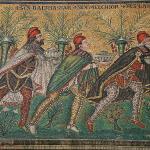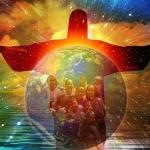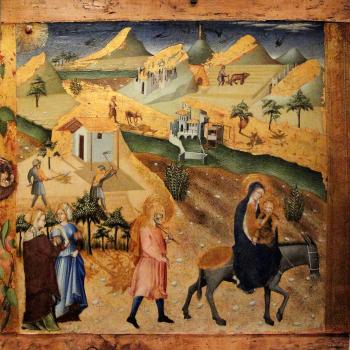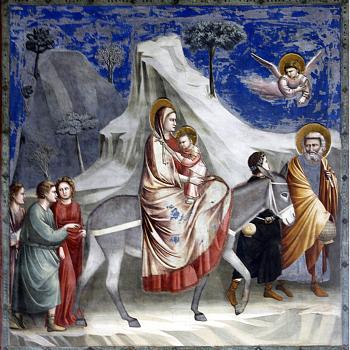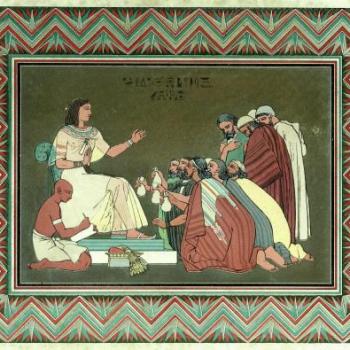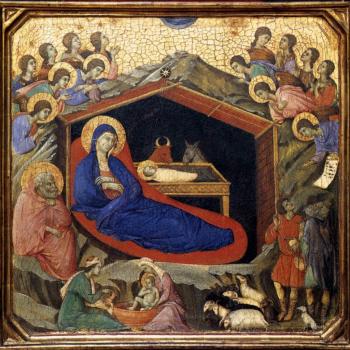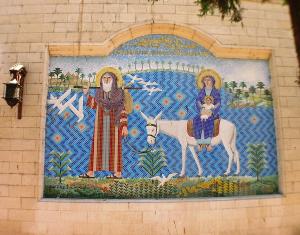
The faith is to be lived out. To do so, we are expected to act with prudence. We should not expect God to do everything for us. That would love us nothing to do. If we believed God should do everything for us and so we do nothing, there would be no purpose for us, no reason for us to live. God can and will often help us in various ways, but more often than not, it will be through inspiration instead of direct intervention. If we do not engage such inspiration properly, if we do not engage it with prudence, we might end up suffering greatly, or worse, dying when we need not die. On the other hand, if we are faithful and wise, we will put our trust in God while doing what we can for ourselves. This is exactly the kind of legacy Joseph left behind: Joseph was a pious man of God, a man who acted in accordance to wisdom and grace, doing what he could to fulfill his role in the world. He trusted in God, but he trusted God would work in and with him in his actions. This is why he took his family to Egypt:
Now when they had departed, behold, an angel of the Lord appeared to Joseph in a dream and said, “Rise, take the child and his mother, and flee to Egypt, and remain there till I tell you; for Herod is about to search for the child, to destroy him.” And he rose and took the child and his mother by night, and departed to Egypt, and remained there until the death of Herod. This was to fulfil what the Lord had spoken by the prophet, “Out of Egypt have I called my son” (Matt. 2:13-15 RSV).
When he was told what Herod desired to do, Joseph didn’t say, “Why should I leave my home? Why won’t my family be safe here? God can take care of us.” Instead, he knew that it was his responsibility to look after his family, to make sure they were safe. Thus, he and his family (including children from a previous family, if Eastern tradition is believed) snuck their way into Egypt (becoming refugees). When they were in Egypt, the Holy Family understood that many of the people, and especially the authorities, were hostile to them. Joseph, guiding his family, decided that they would never stay too long at any one place. They were constantly on the movie, looking for and accepting refuge from those who would give it, while constantly hiding themselves from the authorities who, like Herod, would have had no problem having them imprisoned, banished, or even executed. Thus, the Holy Family, Mary, Joseph, Jesus, James and any other children Joseph might have still had with him, had to put their trust in those who would welcome them, just as refugees today have to rely upon the good will of strangers. Many Egyptians remembered the journey the Holy Family made in Egypt, and so when fortunes changed, many of the places where the Holy Family stayed became sites where Christian churches and monasteries would be built. When Herod died, Joseph knew his time of refuge was over; he took his family back home. Nonetheless, he knew it was best to stay hidden, to stay out of sight, because Archelaus, Herod’s successor, might still wish his family ill:
But when Herod died, behold, an angel of the Lord appeared in a dream to Joseph in Egypt, saying, “Rise, take the child and his mother, and go to the land of Israel, for those who sought the child’s life are dead.” And he rose and took the child and his mother, and went to the land of Israel. But when he heard that Archelaus reigned over Judea in place of his father Herod, he was afraid to go there, and being warned in a dream he withdrew to the district of Galilee. And he went and dwelt in a city called Nazareth, that what was spoken by the prophets might be fulfilled, “He shall be called a Nazarene” (Matt. 2:19-23 RSV).
There are many things we can learn from this story. First and foremost among them is that when danger is near, we should not presume that we can do nothing thinking that God will keep us safe from any and all harm. We must do what we can to protect ourselves (and those around us), instead of testing God, demanding God do for us what we can and should do for ourselves. Indeed, often those who walk with God will find their lives are in peril. Jesus would often go in hiding when he knew someone wished him wrong (cf. Jn. 8:59). That changed when he knew it was time to embrace the cross. He didn’t act as if he were invincible. Why, then, should we? To presume divine protection is to ignore the fact we are to do what we can for ourselves. We are meant to act, for this is how we prove ourselves in and through our trials and temptations. We show our faith through our actions, through our works (cf. Jas. 2:18). God makes room for us and our actions, which is why God will not do everything for us. God might inspire us, God might give us special graces which will help us in the situations which we find ourselves in, but in the end, God wants us to work out our own salvation with fear and trembling, that is, God wants us to cooperate with grace, doing what we can so that there is something for grace to take up and perfect. If we have faith, we show it by what we do. Certainly we are to trust in God, but to do that we must trust that God will work in and with us in our actions, not apart from them. If we don’t give God something to work with, then grace has nothing to perfect. Joseph did exactly what we should all do. He took the situation at hand and engaged it with prudence; if he didn’t, not only would he had failed in his role of guardian of the Holy Family, things would have likely ended up much differently, and Joseph (and others in the family) could have suffered some great loss as a consequence of his imprudence. And so we, too, if we want God to help us, must be willing to do our part, or else suffer the consequences of our inaction.
Stay in touch! Like A Little Bit of Nothing on Facebook.
If you liked what you read, please consider sharing it with your friends and family!


